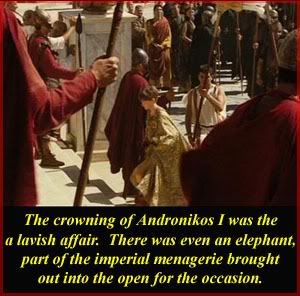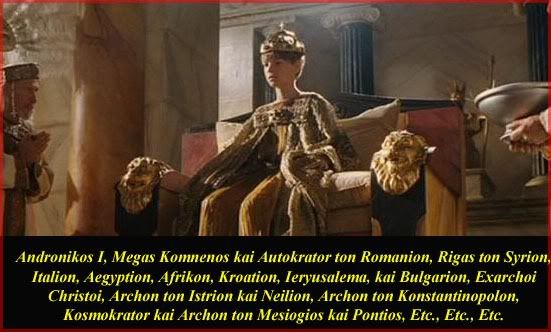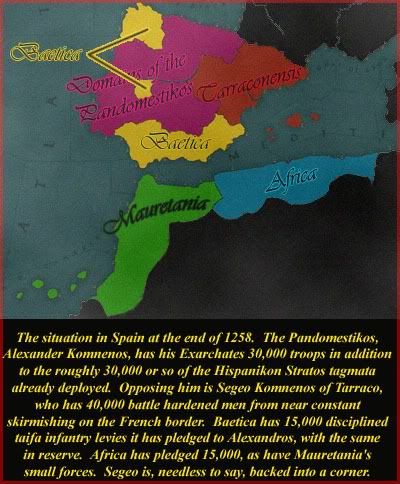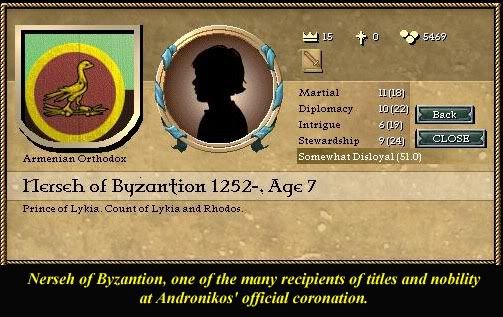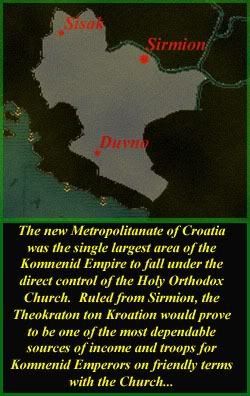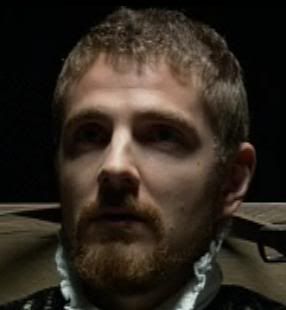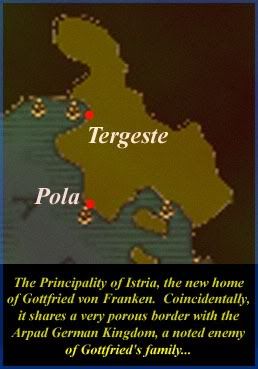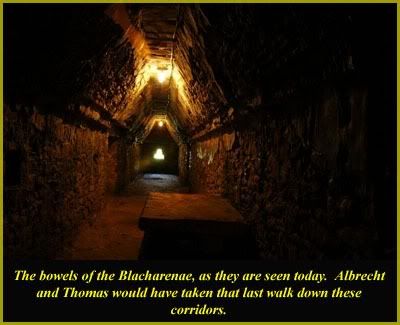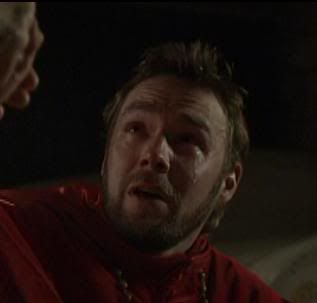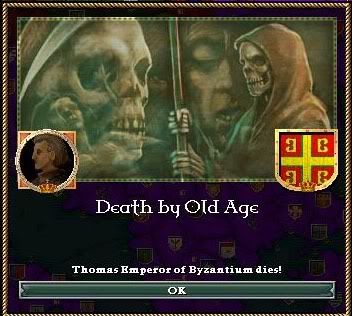Flamey - Welcome to the story! And welcome to the ranks of those who have to wait (I'm not sure that's the best welcome though...

) Which ruler did you like best? I try to respond to each and every person's response to an update, and to questions... sometimes I don't get there, but I try! And you won't have to wait long for the next update!
DarthJF - Welcome back! Your response seems to be a common one to Thomas' death scene (to be honest, at first I didn't understand the reaction... it wasn't till I re-read it a couple days later that
I teared up. So I had my boyfriend read it, and
he teared up, and didn't even read the rest of the reign. Something about an inner child, at death, finding the love he never got in life just got to me. As for the new generations, I shan't spoil anything... just don't read below! And yes, things staying together during Thomas' reign had more to do with Albrecht, Mehtar, and others behind the scenes than Thomas himself... he was good at war, and that was it. Unlike alot of warrior emperors, though, he had the advantage that he
recognized his weakness and sought good counsel elsewhere...
“Christmastide—a time of bittersweet memories.” – attributed to Albrecht von Franken.
December 25th, 1258
Coronations were always vapid affairs—or so Albrecht von Franken remembered himself saying nearly fifty years before, when he’d stood by his long dead friend Thomas and watched him go from Thomas II, underage Emperor to
the Emperor.
Yet this Christmastide, the much older, much wiser von Franken fully appreciated what a coronation did—it visually and symbolically sealed the right of an Emperor to rule, and made a public stage where all the private wrangling, cajoling, and ego-massaging he had grown used to doing could bear fruit.
As incense wafted into the air before the packed
Hagia Sophia, von Franken found little he could complain about. The coronation had gone as smoothly as could be planned, and unlike the rushed, private affair in the immediate aftermath of Nikephoros’ fall, this second, public coronation for Andronikos was far more sumptuous, far more fitting the immense office the tiny boy sitting on the throne now held. It hadn’t been a hard decision—once it was apparent that Nikephoros was awake, and would linger, rather than die immediately, Albrecht decided that a lavish coronation ceremony was needed. The people of Konstantinopolis, as well as the nobles of the Empire, needed to
see and
hear the power of their new Emperor, 11-year old boy or not.
So von Franken had twisted arms, and likely committed the single largest barrage of bribery seen in Imperial history, pouring not just public funds from the imperial coffers but even large amounts of his own significant wealth into the endeavor. Everything began with a magnificent parade, five
tagmata of the Reserve Army marching through the streets in parade uniform, interspersed with musicians, dancers, and the ambassadors of a hundred realms in resplendent cloaks, retainers and gifts in tow.
There was even an elephant from Carthage.
The immense procession first stopped at the
Hagia Sophia, where the Patriarchs of Konstantinopolis, Antioch, Jerusalem and Alexandria—Alexandria only through the promise that large stretches of the upper Nile valley would be granted to the Church—jointly anointed the young boy with holy oil, and pronounced him Andronikos I, by the Grace of God,
Megas Komnenos kai Autokrator ton Romanion, Vice Gerent of Christ, Lord of the Ister and Nile, Guardian of the Holy City, King of Italy, Africa, Egypt, Jerusalem, Syria, Croatia, Serbia and Sicily, etc. etc. etc.
The gathered mass in the
Hagia Sophia, every
dynatoi that could be asked, threatened, bribed, or cajoled into being present in person, bowed to the Emperor and swore before each other and Holy God to be ever true and loyal. The Patriarchs then anointed Albrecht’s wrinkled head as Regent, and asked the audience to swear before Holy God that they would respect the true and loyal guidance of the Regent, as they would love and respect their Emperor, and as they would love and cherish the Word of God.
Albrecht had been pleasantly surprised by the men his networks of bribes and patronage had brought into the city—almost 90% of the
dynatoi in the Central Empire, all the major army commanders, even Konstantinos Komnenos of Tuscany was present. Of the great lords, only the Spanish
Exarchoi were not present, busy as they were either declaring outright rebellion like Segeo (who now styled himself Sergios I, Emperor of the Romans), or answering the call of the
Pandomestikos ton Dytikon, Alexandros Komnenos, to raise arms to subdue the traitorous wretch.
Albrecht in fact had been surprised by the response from the Far West to Alexandros’ call—Mauretania, despite Bartholomaios’ repeated calls that his branch of the Komnenid tree needed more recognition, had mustered his small forces into the field quickly. Even more surprising to von Franken was that the
Exarchoi of Baetica and Africa, despite their grievances and gripes against Konstantinopolis, had publically at least answered the Imperial call. The most recent letter from Alexandros said that both Exarchs had arrived in Crodoba ahead of schedule, and between them were willing to commit some 30,000 troops to Alexandros’ already large force of 40,000
tagmata.
Some things, it appeared, were going well, in spite of the best efforts of those who would bring Romanion to her knees.
Albrecht glanced to the left, at
Jarl Sweyn Thorkillson, the Sortmark ambassador to Konstantinopolis. As if he could feel the heat of Albrecht’s gaze, the Dane squirmed slightly in his heavy fur coat. Albrecht smiled slightly—inside the crowded
Hagia Sophia, his clothes were probably damnably hot, just like his homeland’s current situation. True, the Blue Horde had once again shown itself to mostly be a toothless tiger, but even the most toothless tiger had a big body to throw around. While the Mongols had been unable to decisively defeat the Sortmarkers in a major battle, they
had managed to spend all of the fall and most of the winter launching near constant raids all across the frontier, forcing King Olaf to spread most of his army along the Volga, and away from Romanion, through the early snows. His troops would be tired, ill-fed, and in a bad mood come spring—incompetent as they were, the
Khans in Bolgar had brought the Romans at least a year.
A year the Romans would sorely need, considering the trouble the Danes had stirred. As Albrecht had suspected, the poor equerry who brought that dark demon of a horse to Nikephoros had said little other than screams as he was broken over the wheel, but only a fool couldn’t see the signs when this was placed against the backdrop of other events—Asbjorn Knytling visiting Baghdad and suddenly the young Thomas rising in arms, Segeo arranging for his horse gift through the Danes…
Soon, they would rue the day they lashed out, Albrecht told himself. The Blue Horde was only the first of the coils that would be lashing out at Havigraes, Barcelona, and even Baghdad…
“Nerseh, son of Abados,” Andronikos intoned. Albrecht smiled slightly—the boy was eleven, and the crown was slightly large on his head, but Andronikos looked deadly
serious as he performed the longest ceremony of any coronation day—the awarding of new titles and offices. The boy’s tutors had warned that for someone so young to participate in such a long ceremony would be draining—the boy could lose focus, could make a mistake. Albrecht, and surprisingly the young boy’s mother, Anastasia, had both
insisted he participate
fully. Even now, four hours into the ceremony, Andronikos was still focused, and other than mispronouncing the names of the Prince of Kartli and the Prince of Croatia (whose names were difficult for
Albrecht to pronounce), he had made not a single mistake.
“Step forward, and accept the title
Prigkipas ton Lykion,” the boy continued. All eyes turned to a chubby three year old, whose proud parents gently pushed the toddler forward. The child looked around uncertainly, before ambling forward, looking back at his mother more than the throne to his front. The chamberlain stepped forward, holding the chains of a Prince, easily half the child’s weight. As little Nerseh toddled towards the front, Albrecht smiled—but not for the same reasons as the cooing crowd.
Nerseh’s grandfather had been the famous Mahmud of Byzantion,
Megos Domestikos to Thomas II—and the toddler’s grand-uncle was none other than Sinan of Byzantion, Prince of Gilan and after the doddering, angry Thomas Dadiani, the senior commander of the army of Gabriel’s Persians…
Lykia’s wealth, especially the dues from the port of Rhodes, would be missed, but for those lost taxes, Albrecht had bought time. He didn’t know if old Sinan Byzantion would actively oppose any attempt by Gabriel or his sons to invade the central Empire, but Albrecht’s actions cast a pall of doubt over the old man and his reliability in the eyes of the Gabrielids, no matter what his actual stance was. Additionally, it bought his influential relatives still in the Empire into Albrecht’s fold, including the Prince of Jaffa-Ascalon, Nerseh’s uncle Dauid.
Albrecht was sure that the bribery that had taken place over the past three months would have made even King Herod of old redden in shame. Nerseh was only the last of a series of nobles raised—often to cover gaps in the princely ranks left from “unfortunate incidents,” or imperial lands being parceled off. Albrecht had already promised another of the Dadianis lands outside of Cordoba in Spain, with the title “Prince of Cordoba,” and offered the landless brother of Konstantinos of Italy the position ‘Prince of Armeniacon” with lands centered around Sinope. After the mysterious fire that claimed the life of the Prince of Croatia, last of the Tmpirovich’s, as well as his heir, Albecht had apportioned the former Principality to the Church—lands to be administered on the personal behalf of the office of Patriarch. It was the single largest land grant to the Church outside of Trebizond, and without any imperial cities to cut off tax revenue, it was also probably the wealthiest.
The only position left to be filled in the Empire proper was the Principality of Istria, on the northern fringes of the Adriatic coast. Once ruled by Malhaz Komnenos as an important border
theme, the region was impoverished at best—outside of its port capital of Pola and the neighboring town of Tergeste, the region was commercially overshadowed by the nearby personal properties of the emperor—Zadar to the south, and Venice to the northwest. Von Franken had carefully steered the Adriatic sea traffic to these locations through grants and tax exemptions, enriching the imperial coffers even as the Princes of Istria lost more and more money. The princely title had been sitting vacant since 1238 in fact—the last Prince, Simon Philohepdomos, had thrown his lot with Bardas.
Albrecht smiled slightly—Istria was not the richest post, but in the hands of the right man, it could be turned into something worthwhile. The
Megoskyriomachos turned to his step-son. As he expected, Andronikos still sat rooted in place, the scepter and orb still, unmoving, as if God Himself had fixed them in place.
“Gottfried, son of Albrecht…” the boy said, his voice as flat and monotone as Albrecht could hope on such a solemn occasion.
Albrecht watched as his son looked up, a brief look of confusion on his face, before his eyes instantly went over to his father. Albrecht smiled, but by the sudden change in Gottfried’s expression—from confusion to horror, some of the ice inside Albrecht’s soul had seeped through. Von Franken tried his best to pour some warmth in his expression.
Ah Gottfried. Gottfried the Dependable. Gottfried the Studious, Gottfried the Clerk. They were all apt names for Albrecht’s eldest son, the one he planned to hand his administrative empire, the keys to the power behind the Imperial throne. Unfortunately, Gottfried had another title.
Gottfried the Traitor.
Albrecht was unsure how he kept his smile warmer, but his son’s eyes still looked uncertain. Albrecht, long ago, might have had pretensions, grand dreams, of seeing his throne in Germany restored. They were the dreams of idle youth, of a mind that didn’t know the world, and all the evil and horror that lay outside the safe walls of childhood.
Those dreams died the night Thomas II became sole emperor of Romanion.
Albrecht thus could understand his son’s chafing somewhat, and he could understand the arguments, the anger, that Gottfried held towards his father for not using his unique position to retake the Von Franken crown. But to cast his lot with the
Danes? To plot to murder the
Emperor, the man Albrecht had spent much time and energy putting in place, the man that had stabilized the fractious Roman realm?
Gottfried walked uneasily forward, then knelt before the Throne of Caesars, hands folded in prayer like a penitent. Andronikos looked over to his stepfather and nodded. Slowly, the only speed befitting such a symbolic occasion, he walked towards his son and the chamberlain next to him, princely chains of office dangling from his proffered pillow.
“My son,” Albrecht whispered, smiling as he gave his son a deferential nod. Gottfried smiled uncertainly—was this a joke? When Albrecht lifted from the chamberlain’s proffered hands the chains of a
Prigkipas, he watched as Gottfried’s eyes went wide. He was confused, unsure as to what was happening.
Good.
“Gottfried, son of Albrecht, we, in our infinite wisdom…” the boy intoned from behind Albrecht, but von Franken’s attention was firmly rooted on his son. Gottfried stared, first at his step-brother, then at his father. Albrecht kept that smile, that oh so happy, warm smile, fixed on his face. “…have decided to appoint you
Prigkipas ton Istrion!”
“P…Prince of Istria?” Gottfried’s mouth hung open, as Albrecht gently laid the chains of office over his son’s neck. Gottfried reached up, and touched the pair of chains that hung around him—he was technically now a prince, as well as
Megoslogothetes. He started to smile—a smug little grin, the one made by a man who thinks he has just had even more power thrust on his lap.
“Congratulations, Gottfried,” Albrecht leaned close, that same hard smile still fixing his lips in place. For a second the two stood there, a smiling father looking at his kneeling son, before Albrecht’s words shattered that brief idyllic moment.
“You have failed me.”
Gottfried looked up as his father, wide eyed. By his eyes, Albrecht knew his son thought his word were a joke, a jest of some sort. Slowly, Gottfried shook his head, his eyes wide as Albrecht reached forward yet again.
“Father?” The voice was quiet, frightened. Smoothly, von Franken lifted the chain of
Megoslogothetes from his son’s shoulders. The younger von Franken started to open his mouth, eyes wide. Now he knew, now he understood.
Albrecht smiled sweetly, as he wrapped the now defunct chains of office around his hand.
“I am very disappointed in you,” Albrecht whispered again. He leaned close, and kissed his son’s forehead for the audience before them. He stepped back, smiling for the crowd as his eyes went cold. “If I
ever find you in The City again,” the
Megoskyriomachos smiled, his teeth like fangs, voice quiet and deadly like a Nile viper, “my soul will surely burn in hell, for I will send you there with my own hand.”
Albrecht backed away from his former son, his former pride, his former heir, and bowed. Slowly, symbolically, he dropped the chains of
Megoslogothetes into his own pocket, smile wide and sweet the entire time. The audience thundered its approval, even as Albrecht saw tears in his son’s eyes.
Only a day later, von Franken found himself removed from the richly decorated interior of the greatest church in Christendom—instead, his fine boots echoed across the dusty stone floor of the bowels of the Blacharnae Palace, deep underground. Many of those whose footfalls echoed behind him found themselves in the same place—and all on account of one man who had
not come to the coronation the day before.
“So you’re sure you really want me to go through with it?” Thomas III, Emperor of the Romans, asked insistently right next to Albrecht. “Why? You said it was a daft idea not long before…”
“Thomas, you persuaded me,” Albrecht said, working his best to keep his voice level, calm, despite knowing what was coming. “Draining the Marmara would leave the Empire with new strategic options…”
“Strategic vistas!” Thomas corrected.
“…strategic vistas,” Albrecht quietly adopted his nephew’s language, “as well as new farmland. So…”
“…but why are we here then?” Thomas asked, confusion arcing throughout his high pitched voice. “Shouldn’t we be in the Golden Horn, ordering the ships out? Meeting with the Mason’s Guild to set up fees for the damming costs? Ordering up slaves and laborers from the docks to begin work?”
“Well, I thought you might want
privacy to work on these plans,” Albrecht said grimly as they rounded yet another corner. He refused to look at the man—Thomas’ brown eyes would spark pity, and pity would lead to weakness.
No, this
had to be done!
“Privacy?” Thomas raised an eyebrow. “B…but how? All these people?” the Emperor cast a worried look at the cascade of men behind them. “T…oh, hello Patriarch Thomas!” the Emperor waved eagerly. The Patriarch nodded grimly in reply. Albrecht thought he heard the clergyman’s faithful hound Aquinas make some grim request for forgiveness for what he was about to do, but von Franken paid no attention.
“Need I remind you…”
“Ah, that’s where the wall comes in, yes!” Thomas stopped dead in his tracks, before spinning towards his uncle and burying him in a hug as his laughter screeched up and down the hallway. “Brilliant, Uncle Albie!” he cackled.
Albrecht half-heartedly hugged the man back, trying not to wrinkle his nose at the smell of a man who hadn’t likely seen a bath since the coronation, and covered the smell with the juice of lemons and pickles dabbled over his body. Not soon enough, the emperor let him go, and positively
skipped down the rest of the hallway.
Albrecht looked back momentarily at the multitude that followed him, and met a sea of grim and frightened eyes. They were the cream of the Roman elite—great princes and prelates, high bureaucrats and commanders. Men of substance and position. All had been summoned to the city not just to participate in the lavish ceremonies of the day before, but the quiet, dirty ceremony of today. The deed had to be done—none of them, to a man, had disagreed on that. None of them, however, had the stomach to do the deed themselves—the prelates did not want blood on their hands, the princes did not want regicide hanging above their heads. So Albrecht proposed they
all share the guilt—no one could then point a finger at another, no one could start rumors about his brother. They would all share the responsibility, and all share the guilt. And it would be done in a way where no blood would be spilt—not a single drop.
The hallway wound down, leading to a large room, easily thirty feet high, and roughly round in shape. Its walls were soliad brick, polished and fitted extra smooth at von Franken’s orders long ago. Whereas before it’d been dominated by the rack used by Eleutherios to great effect for many years, it now only held a simple table and two chairs, covered with reams of parchment, an inkwell, an ink bladder, and no less than fifteen quills. The Emperor stopped—the view to him was so stunning he scarcely noted the mortar mixing bucket, sacks, bricks and trowel sitting next to the entryway.
“This is it?” Thomas asked, waltzing into the room and spinning around. “It’s
wonderful! Perfectly done brickwork!” the Emperor cooed, running to the nearest wall and running his hands over the mortar.
Albrecht said nothing, instead walking over to the bucket. As he’d instructed, a fresh batch of mortar, no more than twenty minutes old, was sitting inside. Without any ceremony or words, the old Megoskyriomachos knelt as his nephew burbled happily from the inside. Albrecht was normally not a religious person, but that pang of guilt, the voices of his nephew from long enough, they all made him quietly say a brief prayer.
“Lord God, forgive me for what I’m about to do,” he whispered, before sticking the trowel into the mortar, drawing out a thick clump, and splaying it onto the floor. A few seconds later, a brick was on the mortar, and Albrecht felt rather than heard, his nephew’s sudden presence.
“And what have we here, hmm?” Thomas asked in that high-pitched, excited voice of his. “That’s a good lay, for an amateur!” the Emperor cackled, his breath foul. “And are all these people going to merely watch?”
“No, Thomas,” Albrecht said quietly, his head still down, “they’re going to each lay a brick for you,” he lied, “to symbolize their support for your Marmara plan.”
He heard Thomas giggle. “Really?” the Emperor asked. Albrecht slowly rose, head still down, then turned around. A sea of blanched, frightened faces greeted him. The Megoskyriomachos’ finger pointed at the Patriarch of Konstantinopolis. Thomas the Cleric, clad in the brilliant scarlet robes he preferred, pointed mournfully at his own chest, before slowly walking forward to take Albrecht’s place.
“Majesty,” Albrecht heard the Patriarch say. He turned, and watched as the clergyman knelt. He could hear mutterings from the man—a prayer of some sort.
“No need to pray for me!” the Emperor giggled. “Come, don’t be so morose! Lay a brick!”
Thomas roughly pulled the Patriarch’s head up, and all but shoved him towards the mortar bucket. Slowly, hands shaking so badly the trowel rattled against the edges of the bucket, the Patriarch drew out a dapple of mortar and laid it on the floor.
Thomas laughed.
“You’re doing it wrong!” Velvet hands met cardinal red, and quickly the Patriarch found himself pushed away. “See, first, you have to lay the foundation for the mortar,” the madman said, his tone that of an exasperated master explaining a simple task to a dull apprentice. “All of you, look!” Thomas gestured. By his eyes, he didn’t recognize the confused looks on their faces at all. “You have to make sure the mortar is thick enough! A thin mortar strip of mortar is as useless as a thin column!” With a few more unsavory slaps as the Emperor hand-forced the Patriarch to lay more mortar in place, Thomas leaned back. “Now, the brick!”
“Wha…” the Patriarch started to say, before the Emperor rolled his eyes and growled.
“Brick! Here! Now!” Thomas pointed angrily at the thick goop of mortar on the floor. The Patriarch swallowed hard, and looked back at Albrecht in desperation—a move that only agitated the madman more. “Quick, you fool, before it dries!” Thomas yelled, grabbing the Patriarch with a velveted hand and shoving him towards the pile of bricks next to the hallway.
Like a dazed man stuck in a trance, Patriarch Thomas slowly picked up a brick, and stumbled over to the entryway. After a few moments of half-hearted setting it in place, he was shoved away by the madcap Emperor.
“Go away! Uncle Albie’s a much better mason than you, y’fool!” The imperial hands quickly and roughly shifted the brick into place, before Thomas looked up with wide, expect eyes. “Who’s next! Don’t be shy!” the Emperor called.
“God have mercy,” Patriarch Thomas crossed himself, tears streaking his face as he walked away from the scene.
And so the macabre scene played itself out—the great lords of the Empire, from the Prince of Tuscany to the Megos Domestikos, each walked forward to lay a brick before the room that would soon be the tomb of Emperor Thomas III. Some went eagerly—Adrianos Komnenos even was smiling as he laid his stone in place. Most went solemnly, and Metropolitan Aquinas openly wept. As each and every one approached, Thomas would critique their bricklaying skill, making suggestions on how to lay the mortar so it would stick better. Sometimes he even corrected their work, and in the case of Aquinas, he grew so annoyed at the clergyman’s weeping and crooked work that he snatched the trowel from his hands, and berated him for “doing a half-assed job,” while laying the brick himself.
Slowly, as each lord and prelate symbolically placed their brick, the wall rose—first to a man’s knees, then his thighs, then his chest. All the while Thomas giggled, encouraged, and in his twisted way helped as much as he could. As each man finished his lone part in the dark play, he quietly filed out of the hallway—most uttered prayers, some for Thomas’ soul, a few for their own. Finally, the wall reached the Emperor’s head, and Albrecht heard a stool being dragged over through the narrow crack. Hands reached into the crack, and pulled the mortar mixer and trowel over to the other side.
“Uncle Albie!” Thomas’ voice squeaked from the other side, “I can handle it from here! I have a footstool and everything!”
Albrecht looked quietly at the two remaining men—the Prefect of the City and the Metropolitan of Thessalonike. Both men’s faces were pale, eyes wide at the hours long scene that had played out before them.
“He goes of his own will?” the Metropolitan asked shakily, quietly crossing himself.
“With God’s grace,” Albrecht said with quiet bitterness. The Megoskyriomachos looked both men up and down. The Metropolitan was clearly broken by what he’d seen—few could comprehend a madman willingly walling himself up. The Prefect was Albrecht’s own man—he’d say nothing of what had happened this day. After a moment’s thought, the Megoskyriomachos waved them off. With surprising alacrity for their ages, the two men disappeared down the corridor, leaving Albrecht alone with a bricked up doorway, a tiny hole at its top, and the scraping noises of a new batch of mortar being made on the other side.
“Thomas, are you sure you can handle this?” Albrecht asked, his own voice shaky.
“Yes!” his nephew chirped back. “I’m planning on adding a second layer of brick after this one, make it extra soundproof!”
Albrecht felt a lump forming in his throat. Without seeing those maddened eyes, that twitch of the crazed, all he could hear was the same happy voice he was used to from 20 years before—the young man who didn’t want to be emperor, who only wanted to build churches, statues and canals. The architect, not the insane emperor.
“You…” Albrecht said, before a lump robbed him of his voice, “are you sure there’s enough mortar for that?”
“More than enough!” Thomas called back. “You can go if you like! This’ll take a while!”
Albrecht started to open his mouth, but nothing came out. He tried to think of what to say, but nothing would come. Deprived of thought and speech, the old man slowly turned, feeling dirty despite how cheerfully his nephew had gone to his doom.
“Thank you, Uncle Albie!” Albrecht thought he heard through that narrow slot, before it, too, was blotted out. Then the Megoskyriomachos heard several chinks—a trowel knocking the final brick into place.
Then silence.
So Thomas III cheerfully allows himself to be buried alive, just one day after Andronikos has a massive coronation ceremony. Segeo appears to be in a massive spot, while the Mongols are harassing the Danes. Things seem on the up and up, and Albrecht seems to be having the problems well in hand. Ah, who are we kidding? When is the other shoe going to drop? And where? Will it be a shoe, or a giant boot of doom? More will be revealed as the next chapter of Rome AARisen appears!


